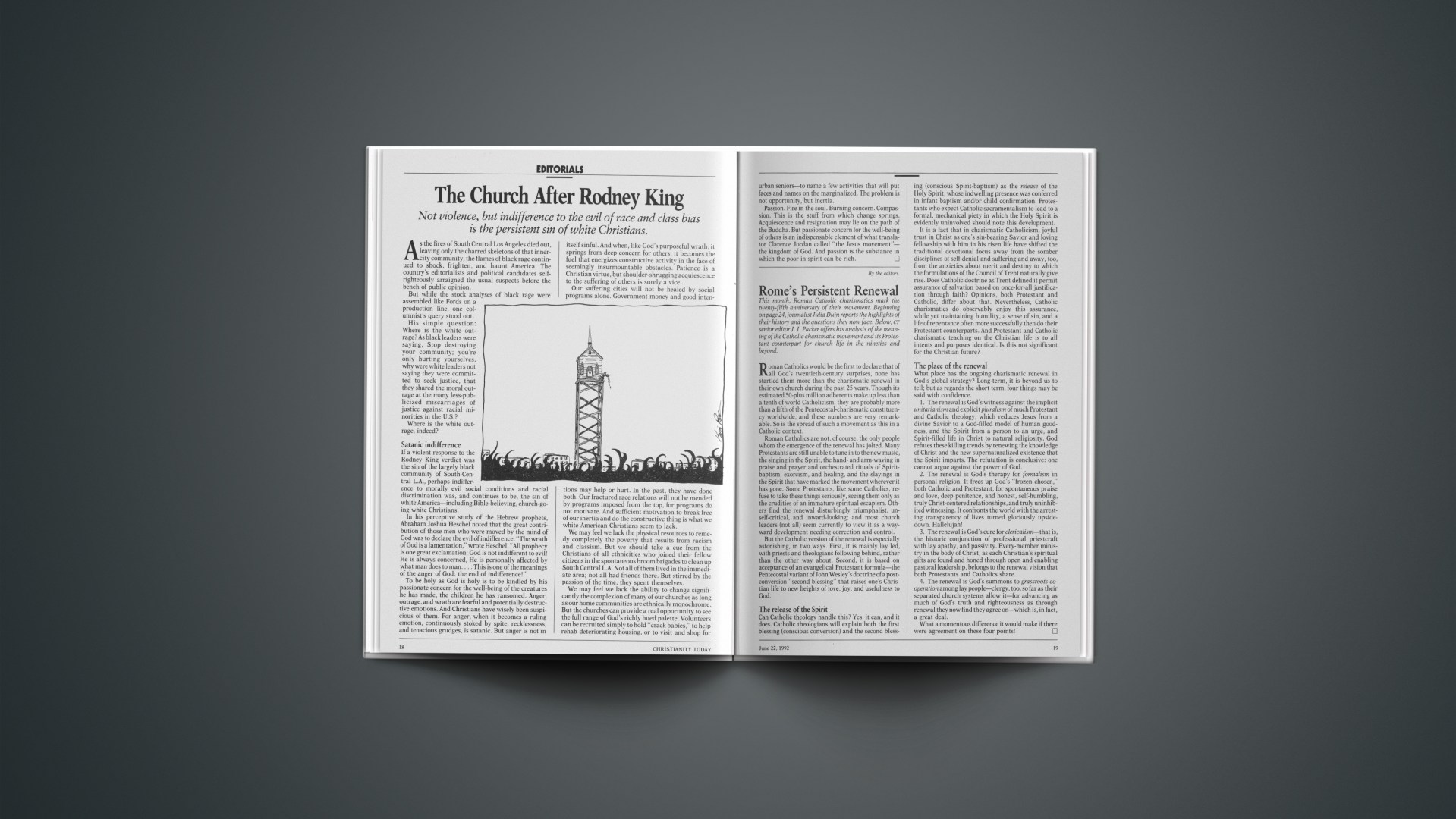This month, Roman Catholic charismatics mark the twenty-fifth anniversary of their movement. Beginning on page 24, journalist Julia Duin reports the highlights of their history and the questions they now face. Below, CT senior editor J. I. Packer offers his analysis of the meaning of the Catholic charismatic movement and its Protestant counterpart for church life in the nineties and beyond.
Roman Catholics would be the first to declare that of all God’s twentieth-century surprises, none has startled them more than the charismatic renewal in their own church during the past 25 years. Though its estimated 50-plus million adherents make up less than a tenth of world Catholicism, they are probably more than a fifth of the Pentecostal-charismatic constituency worldwide, and these numbers are very remarkable. So is the spread of such a movement as this in a Catholic context.
Roman Catholics are not, of course, the only people whom the emergence of the renewal has jolted. Many Protestants are still unable to tune in to the new music, the singing in the Spirit, the hand-and arm-waving in praise and prayer and orchestrated rituals of Spirit-baptism, exorcism, and healing, and the slayings in the Spirit that have marked the movement wherever it has gone. Some Protestants, like some Catholics, refuse to take these things seriously, seeing them only as the crudities of an immature spiritual escapism. Others find the renewal disturbingly triumphalist, unself-critical, and inward-looking; and most church leaders (not all) seem currently to view it as a wayward development needing correction and control.
But the Catholic version of the renewal is especially astonishing, in two ways. First, it is mainly lay led, with priests and theologians following behind, rather than the other way about. Second, it is based on acceptance of an evangelical Protestant formula—the Pentecostal variant of John Wesley’s doctrine of a post-conversion “second blessing” that raises one’s Christian life to new heights of love, joy, and usefulness to God.
The Release of the Spirit
Can Catholic theology handle this? Yes, it can, and it does. Catholic theologians will explain both the first blessing (conscious conversion) and the second blessing (conscious Spirit-baptism) as the release of the Holy Spirit, whose indwelling presence was conferred in infant baptism and/or child confirmation. Protestants who expect Catholic sacramentalism to lead to a formal, mechanical piety in which the Holy Spirit is evidently uninvolved should note this development.
It is a fact that in charismatic Catholicism, joyful trust in Christ as one’s sin-bearing Savior and loving fellowship with him in his risen life have shifted the traditional devotional focus away from the somber disciplines of self-denial and suffering and away, too, from the anxieties about merit and destiny to which the formulations of the Council of Trent naturally give rise. Does Catholic doctrine as Trent defined it permit assurance of salvation based on once-for-all justification through faith? Opinions, both Protestant and Catholic, differ about that. Nevertheless, Catholic charismatics do observably enjoy this assurance, while yet maintaining humility, a sense of sin, and a life of repentance often more successfully then do their Protestant counterparts. And Protestant and Catholic charismatic teaching on the Christian life is to all intents and purposes identical. Is this not significant for the Christian future?
The Place of the Renewal
What place has the ongoing charismatic renewal in God’s global strategy? Long-term, it is beyond us to tell; but as regards the short term, four things may be said with confidence.
1. The renewal is God’s witness against the implicit unitarianism and explicit pluralism of much Protestant and Catholic theology, which reduces Jesus from a divine Savior to a God-filled model of human goodness, and the Spirit from a person to an urge, and Spirit-filled life in Christ to natural religiosity. God refutes these killing trends by renewing the knowledge of Christ and the new supernaturalized existence that the Spirit imparts. The refutation is conclusive: one cannot argue against the power of God.
2. The renewal is God’s therapy for formalism in personal religion. It frees up God’s “frozen chosen,” both Catholic and Protestant, for spontaneous praise and love, deep penitence, and honest, self-humbling, truly Christ-centered relationships, and truly uninhibited witnessing. It confronts the world with the arresting transparency of lives turned gloriously upside-down. Hallelujah!
3. The renewal is God’s cure for clericalism—that is, the historic conjunction of professional priestcraft with lay apathy, and passivity. Every-member ministry in the body of Christ, as each Christian’s spiritual gifts are found and honed through open and enabling pastoral leadership, belongs to the renewal vision that both Protestants and Catholics share.
4. The renewal is God’s summons to grassroots cooperation among lay people—clergy, too, so far as their separated church systems allow it—for advancing as much of God’s truth and righteousness as through renewal they now find they agree on—which is, in fact, a great deal.
What a momentous difference it would make if there were agreement on these four points!










